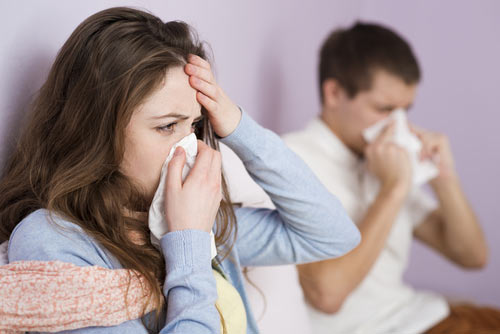What Are the Signs of a Mold Related Illness?
 You've heard and read numerous stories about "sick" buildings causing serious health problems in occupants. Since there's no clear-cut definition of a mold-related illness, you may be concerned about recognizing the signs in yourself or family members.
You've heard and read numerous stories about "sick" buildings causing serious health problems in occupants. Since there's no clear-cut definition of a mold-related illness, you may be concerned about recognizing the signs in yourself or family members.
Mold spores are invisible to the naked eye, so you come into contact with them on a daily basis, whether you realize it or not. If you begin to experience any of these symptoms for no apparent reason, it could be an indication of mold inside your home or building.
Upper Respiratory Ailments
Your respiratory system is the most common point of access for mold spores, so it's not surprising that irritated sinus passages are a frequent result of exposure. Even people who are generally allergy-free can experience symptoms such as wheezing, runny nose and itchy, watery eyes.
Mold can also be the cause of more serious breathing problems like asthma and hypersensitivity pneumonitis, particularly in children and people with compromised immune systems. Extended exposure to a form of mold known as Aspergillus can result in a lung infection called aspergillosis.
Digestive Problems
If mold is ingested or absorbed through the skin, harmful substances called mycotoxins can cause irritation to your digestive system. Symptoms may include:
• Nausea
• Diarrhea
• Sharp abdominal pains and cramps
• Loss of appetite
Sudden, unexplained weight gain can also result from mold exposure. Leptin is a hormone that regulates appetite. Your body's inflammatory response to the mycotoxins produces chemicals that block leptin receptors, and the resulting imbalance can cause weight gain, even from normal calorie intake.
Depression
Mold is usually linked with physical illnesses, but researchers have found a connection to depression and other psychological distress. People exposed to mold can suffer from insomnia and low energy levels leading to depression, while perceived lack of control over one's environment is another factor.
Numbness, Tingling and Muscle Pain
Mycotoxins in mold can interfere with your body's sensory nerves, resulting in your extremities "falling asleep," but with no evident cause. You may also experience muscle pain despite no corresponding increase in physical activity.
"Brain Fog"
One of the more disturbing mold-related illnesses is a disruption in cognitive functions, commonly referred to as "brain fog." Many people who have reported symptoms such as memory loss, confusion and inability to focus have ultimately discovered extensive mold colonies in their homes.
Don't Let a "Sick" Building Destroy Your Health
Are you or your loved ones experiencing any of these chronic unexplained symptoms? Consult your primary care physician immediately for treatment, and schedule a professional inspection of your home for mold. If evidence of mold is found, the sooner it's removed, the sooner you'll regain your good health.